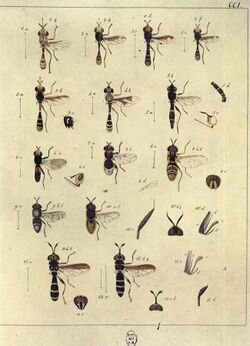Biology:Callicera
From HandWiki
Short description: Genus of flies
| Callicera | |
|---|---|

| |
| Illustration in Johann Wilhelm Meigen Europäischen Zweiflügeligen Figure 10 | |
| Scientific classification | |
| Kingdom: | |
| Phylum: | |
| Class: | |
| Order: | |
| Family: | |
| Subfamily: | |
| Tribe: | |
| Genus: | Callicera Panzer, 1809
|

| |
| range map 2023 | |
Callicera is a Holarctic genus of hoverflies[1]
Medium-sized to rather large (wing length 9·75–15 mm.) bumblebee mimics. They are beautiful metallic flies, with strikingly long antennae. All the species are considered rare. Callicera larvae live in water rot-holes of overmature trees as saprophages. They occur mainly in ancient forests where they are arboreal.[2][3][4][5][6][7] [8] Callicera have been used as bioindicators.
Species
- C. aenea (Fabricius, 1781)[9]
- C. aurata (Rossi, 1790)
- C.christiani (Ghorpade, 1982)
- C.doleschalli (Verrall, 1913)
- C. duncani Curran, 1935
- C. erratica (Walker, 1849)
- C. exigua Smit, 2014
- C. fagesii Guérin-Menéville, 1844
- C. macquarti Rondani, 1844
- C. montensis Snow, 1892
- C. nitens (Coe, 1964)
- C.poultoni (Verrall, 1913)
- C.robusta (Coe, 1964)
- C. rohdendorfi Zimina, 1982
- C. rufa Schummel, 1842
- C.sackeni (Verrall, 1913)
- C. scintilla Smit, 2014
- C. spinolae Rondani, 1844
- C. sumatrensis (Meijere, 1919)
References
- ↑ Stubbs, Alan E.; Falk, Steven J. (1983). British Hoverflies: An Illustrated Identification Guide. British Entomological & Natural History Society. pp. 253, xvpp.
- ↑ Speight, M.C.D. (2011). "Species accounts of European Syrphidae (Diptera)". Syrph the Net, the Database of European Syrphidae 65: 285pp. http://www.diptera.info/downloads/StN_Species_Accounts_Glasgow_2011.pdf.
- ↑ Van der Goot,V.S. (1981) De zweefvliegen van Noordwest – Europa en Europees Rusland, in het bijzonder van de Benelux. KNNV, Uitgave no.32: 275pp. Amsterdam.
- ↑ Stubbs, Alan E.; Falk, Steven J. (1983). British Hoverflies: An Illustrated Identification Guide (2nd (revised) ed.). British Entomological & Natural History Society. p. 271, xvpp. ISBN 0-9502891-3-2.
- ↑ Bei-Bienko, G.Y. & Steyskal, G.C. (1988a) Keys to the Insects of the European Part of the USSR, Volume V: Diptera and Siphonaptera, Part I. Amerind Publishing Co., New Delhi. ISBN:81-205-0080-6.
- ↑ Van Veen, M. (2004) Hoverflies of Northwest Europe: identification keys to the Syrphidae. 256pp. KNNV Publishing, Utrecht.addendum
- ↑ Coe, R.L. (1953) Diptera: Syrphidae. Handbks.ident.Br.insects, 10(1): 1–98. R.ent.Soc.London. pdf
- ↑ Peck, L.V. (1988) Syrphidae. In: Soos, A. & Papp, L. (eds.) Catalogue of Palaearctic Diptera, 8: 11–230. Akad.Kiado, Budapest.
- ↑ Barkalov, A.V. "Syrphidae collection of Siberian Zoological Museum". Novosibirsk, Russia: the Institute of Animal Systematics and Ecology, Siberian Branch of the Russian Academy of Sciences. Archived from the original on 20 October 2008. https://web.archive.org/web/20081020082104/http://szmn.sbras.ru/Diptera/Syrphidae.htm. Retrieved 29 July 2009.
External images
Wikidata ☰ Q1946378 entry
 |

